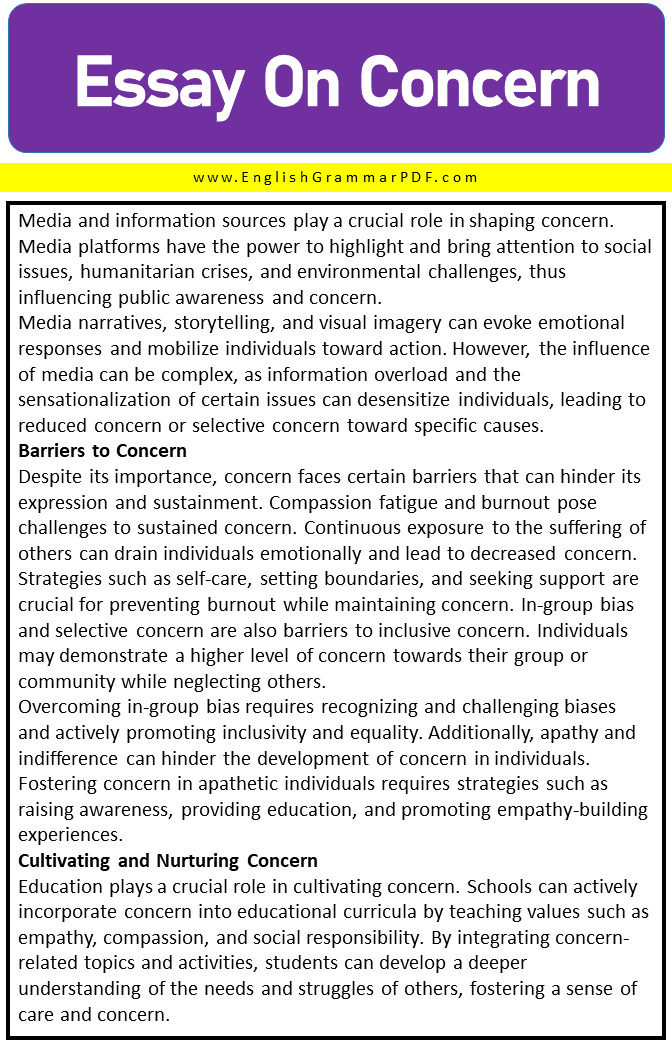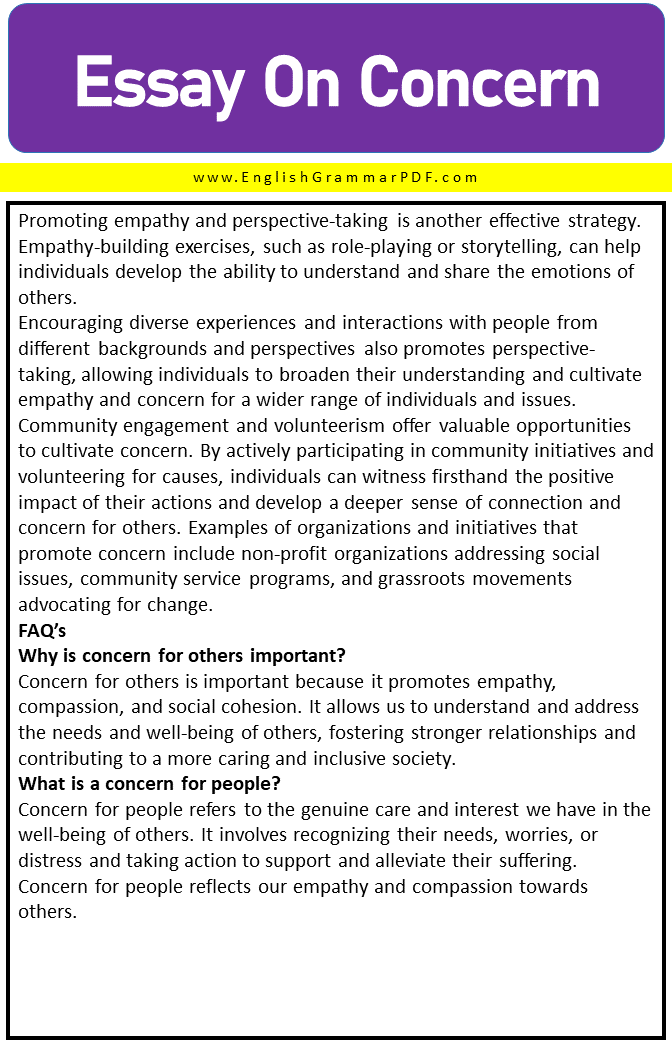Essay On Concern
Outline of Essay:
- Introduction
- The Nature of Concern
- Types of Concern
- The Impact of Concern
- Factors Influencing Concern
- Barriers to Concern
- Cultivating and Nurturing Concern
Introduction
The concern is a fundamental aspect of human experience and plays a significant role in shaping our lives and interactions with the world around us. It is a deep sense of care and interest that we feel towards someone or something. This essay explores the concept of concern, its nature, types, impact, factors influencing it, barriers to concern, and ways to cultivate and nurture concern. By understanding concern and its implications, we can enhance our well-being and contribute to the betterment of society.
The Nature of Concern
Concern can be understood as an emotion that arises from genuine care for the well-being of others or oneself. It involves an empathetic response to the needs, worries, or distress of individuals or entities. From a psychological perspective, concern is closely linked to empathy, compassion, and altruism. It arises from our ability to recognize and connect with the experiences and emotions of others, motivating us to take action and alleviate their suffering. Additionally, concern has deep evolutionary roots, as it contributes to the survival and cohesion of social groups.
Types of Concern
Personal concern primarily revolves around an individual’s well-being. It encompasses the worries and care one has for oneself, including physical health, emotional well-being, and personal growth. The personal concern is rooted in self-preservation and self-improvement.
Within personal concern, there is also a subset of concern for immediate family and close friends. This type of concern is characterized by deep emotional investment and care for the well-being of loved ones. It includes worries about their happiness, safety, and overall quality of life.
Social concern expands the sphere of care beyond the self and close relationships to encompass the welfare of the community. It involves a sense of responsibility and a desire to contribute to the greater good. Social concern includes actively working towards improving the lives of others within the community, addressing social issues, and promoting social justice.
Global concern broadens the scope of care to include the environment and global issues. It encompasses concerns about the state of the planet, sustainability, and the impact of human activities on the natural world. Additionally, global concern extends to pressing global issues such as poverty, conflict, inequality, and human rights violations. It involves a deep sense of responsibility toward creating a more equitable and sustainable world.
The Impact of Concern
Concern significantly contributes to individual well-being by providing emotional and psychological benefits. When individuals genuinely care about the well-being of others, they experience positive emotions such as empathy, compassion, and kindness.
These emotions not only foster a sense of connection with others but also contribute to personal happiness and satisfaction. Concern also promotes personal growth and fulfillment as individuals engage in acts of care and support, which can lead to a sense of purpose and a greater understanding of one’s values and priorities.
Concern plays a crucial role in building and strengthening relationships and social bonds. When individuals demonstrate concern for others, it fosters trust, mutual support, and empathy within communities. It creates a sense of belonging and interconnectedness, leading to more meaningful and fulfilling relationships. Communities that prioritize and cultivate concern are more likely to be supportive and cohesive, promoting overall social well-being.
Furthermore, concern serves as a powerful motivator for collective action and social change. When individuals feel concerned about societal issues or injustices, it compels them to take action and work towards addressing those issues.
Historical movements such as the civil rights movement, women’s suffrage movement, and environmental activism have been driven by collective concern for equality, justice, and the environment. Concern ignites a sense of responsibility and inspires individuals to advocate for change, leading to significant social transformations.
Factors Influencing Concern
Factors influencing concern encompass a range of elements that shape the development, expression, and extent of individuals’ caring and compassionate attitudes toward others. Empathy and perspective-taking play crucial role in fostering concern.
Empathy allows individuals to emotionally connect with others, understand their experiences, and share their emotions. By putting oneself in another’s shoes, perspective-taking enhances concern, as it deepens the understanding of others’ needs, worries, and suffering. It bridges the gap between individuals and promotes a genuine sense of care and support.
Cultural and societal influences significantly impact the expression of concern. Cultural variations exist in how the concern is demonstrated and valued across different societies. Norms and values associated with collectivism or individualism shape the emphasis placed on concern for others within a community or towards a broader societal context. Societal expectations, such as gender roles and social hierarchies, can also influence the distribution of concern and the groups towards which it is directed.
Media and information sources play a crucial role in shaping concern. Media platforms have the power to highlight and bring attention to social issues, humanitarian crises, and environmental challenges, thus influencing public awareness and concern.
Media narratives, storytelling, and visual imagery can evoke emotional responses and mobilize individuals toward action. However, the influence of media can be complex, as information overload and the sensationalization of certain issues can desensitize individuals, leading to reduced concern or selective concern toward specific causes.
Barriers to Concern
Despite its importance, concern faces certain barriers that can hinder its expression and sustainment. Compassion fatigue and burnout pose challenges to sustained concern. Continuous exposure to the suffering of others can drain individuals emotionally and lead to decreased concern.
Strategies such as self-care, setting boundaries, and seeking support are crucial for preventing burnout while maintaining concern. In-group bias and selective concern are also barriers to inclusive concern. Individuals may demonstrate a higher level of concern towards their group or community while neglecting others.
Overcoming in-group bias requires recognizing and challenging biases and actively promoting inclusivity and equality. Additionally, apathy and indifference can hinder the development of concern in individuals. Fostering concern in apathetic individuals requires strategies such as raising awareness, providing education, and promoting empathy-building experiences.
Cultivating and Nurturing Concern
Education plays a crucial role in cultivating concern. Schools can actively incorporate concern into educational curricula by teaching values such as empathy, compassion, and social responsibility. By integrating concern-related topics and activities, students can develop a deeper understanding of the needs and struggles of others, fostering a sense of care and concern.
Promoting empathy and perspective-taking is another effective strategy. Empathy-building exercises, such as role-playing or storytelling, can help individuals develop the ability to understand and share the emotions of others.
Encouraging diverse experiences and interactions with people from different backgrounds and perspectives also promotes perspective-taking, allowing individuals to broaden their understanding and cultivate empathy and concern for a wider range of individuals and issues.
Community engagement and volunteerism offer valuable opportunities to cultivate concern. By actively participating in community initiatives and volunteering for causes, individuals can witness firsthand the positive impact of their actions and develop a deeper sense of connection and concern for others. Examples of organizations and initiatives that promote concern include non-profit organizations addressing social issues, community service programs, and grassroots movements advocating for change.
FAQ’s
Why is concern for others important?
Concern for others is important because it promotes empathy, compassion, and social cohesion. It allows us to understand and address the needs and well-being of others, fostering stronger relationships and contributing to a more caring and inclusive society.
What is a concern for people?
Concern for people refers to the genuine care and interest we have in the well-being of others. It involves recognizing their needs, worries, or distress and taking action to support and alleviate their suffering. Concern for people reflects our empathy and compassion towards others.
Download the PDF of the Essay:
Explore More Essays:








